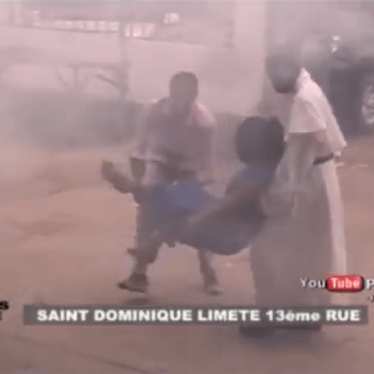(Kinshasa) – Authorities in the Democratic Republic of Congo should immediately release the pro-democracy activist Carbone Beni, who has been arbitrarily detained by the national intelligence agency since December 2017, Human Rights Watch said today. Beni was badly beaten during his arrest in Kinshasa, the capital, and his health has deteriorated rapidly in recent days.
Congolese authorities should promptly and unconditionally free all democracy and human rights activists arbitrarily detained across the country, Human Rights Watch said.
“Carbone Beni has been a tireless advocate for democracy and respect for basic rights in Congo,” said Ida Sawyer, Central Africa director at Human Rights Watch. “We are deeply concerned about Beni’s health and safety following months of wrongful detention, and urge his immediate release.”
Intelligence agents and police arrested Beni, 33, network coordinator of the Filimbi (“whistle” in Swahili) citizens’ movement, on December 30 together with five other activists as they mobilized Kinshasa residents for nationwide protests the following day. Two of the activists arrested with Beni were soon released, while the rest – Beni, Grâce Tshunza, Cédric Kalonji, and Mino Bompomi – have been held by Congo’s intelligence services, without charge.
One witness told Human Rights Watch that intelligence agents and police officers beat the six activists after their arrests because they were “fighting the head of state” and would “die because [they were] stubborn.” Then the police presented the activists to journalists as “terrorists disturbing public order.” Police officers and intelligence agents questioned them until nightfall at a police office in Kinshasa. The witness said that whenever the detainees “gave an answer that didn’t satisfy them,” the police beat them. The authorities then told them they would be taken to the intelligence services and killed.
Beni and the others were then transferred to the national intelligence agency (Agence nationale de renseignements, ANR) detention center in Kinshasa known as “3Z.” In January, Beni spent a few days at a medical clinic run by the ANR for treatment of injuries to his lower abdomen and left knee suffered at the time of arrest.
Beni said that the pain in his lower abdomen worsened in recent days. On May 1, 2018, he was taken to Kinshasa’s Ngaliema Clinic, where he was diagnosed with a hernia and appendicitis. On May 2, he was transferred to the Diamant Clinic for a hernia operation.
Since February, family members have been occasionally allowed to bring food to Beni and the other activists. Beni’s lawyer was only allowed to visit him at the hospital on May 2, and only in the presence of intelligence agents. The others have not had access to their lawyers.
Another Filimbi activist, Palmer Kabeya, was abducted in Kinshasa on December 23 by unidentified men who found him with Filimbi membership cards and the movement’s charter. He was detained at a military intelligence detention center until April 3, when he was transferred to the ANR’s 3Z jail. Like the other detained Filimbi activists, he has not been charged, and he has not had access to his family or lawyer. He has reportedly lost considerable weight and suffers from complications due to asthma.
The Filimbi activists are among hundreds of human rights and pro-democracy activists, journalists, and political opposition leaders and supporters arrested since 2015 during the Congolese government’s widespread crackdown on opponents of President Joseph Kabila’s efforts to remain in power beyond his constitutionally mandated two-term limit, which ended in December 2016.
Many have been held for weeks or months in secret detention, without charge and without access to families or lawyers. Others have been tried on trumped-up charges. Some allege that they were mistreated or tortured and are suffering serious health complications.
Under Congolese law, all detainees have the right to legal assistance and must be brought before a competent judicial authority within 48 hours of arrest.
Beni and Kabeya have been arbitrarily detained previously.
“We have an ideal to defend: to see Congo really change,” Beni told Human Rights Watch shortly before his arrest in December. “My engagement continues because I want to see the country move forward: with development, basic freedoms, delivery of social services, and a government that recognizes the realities of the country. And this requires a commitment from activists. Today, we need to defend the rights of all Congolese. And it’s this hope that we’ll see real change that keeps us going.”
Other pro-democracy activists have also been targeted in recent months. On February 25, police shot dead the well-known activist Rossy Mukendi, a member of the Collectif 2016 citizens’ movement, just outside his church in Kinshasa during a peaceful protest called by the Catholic Church’s Lay Coordination Committee. Witnesses and activists believe he was deliberately targeted. Authorities have refused to hand over his body to allow his family to organize his burial.
On April 23, the ANR arrested Mathieu Kanga, a leading activist in the northeastern city of Kisangani, while he was mobilizing people for a peaceful protest against growing insecurity there. He was tried immediately, convicted of “inciting civil disobedience,” and sentenced to six months in prison. Across the country, dozens of political prisoners and pro-democracy activists remain in prison and others are in exile.
“Congolese authorities should immediately release the activists arbitrarily detained and allow people to peacefully protest and express their views,” Sawyer said. “Congo’s international partners should take a stronger stance in condemning such repression.”









